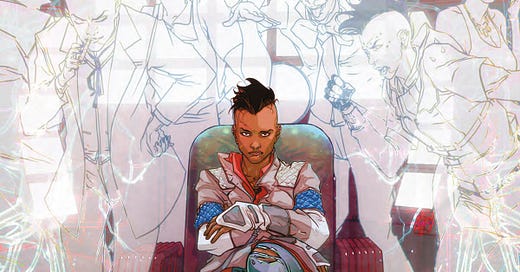Second edition of the “Quick read” format in English, due to lack of time, of will, and recent health problems to deal with. Let’s start.
“All Bad Music Will Eventually Disappear”, according to Ted Gioia:
“Time relentlessly destroys almost every artistic reputation. Only a few works survive this brutal process, and they must possess some special merit—something far greater than a newsworthy award or favorable reviews—to gain the allegiance of posterity.” “But […] Although bad music will disappear, not all good music survives.” “We don’t need to destroy the bad stuff, because there’s some kind of quasi-evolutionary process at work that will eliminate it anyway. But goodness is more fragile, and needs our support.” “I’m absolutely convinced that’s true of music. But it just might apply to everything else too.”
Kakao Piccoma exits European market, refocuses on Japan: “Market dynamics have changed since Kakao Piccoma entered Europe. As concerns about profitability and internal assessments persist, the decision to withdraw appears to be aimed at restructuring business focus and strategies,” an industry insider said. According to French media reports and other sources, Kakao Piccoma‘s European subsidiary saw operating losses totaling more than 10 million euros ($10.8 million) in 2022.”
Dan Lin now leads Netflix film division: “The aim is to make Netflix’s movies better, cheaper and less frequent.” “Film is contracting. Fewer major players are releasing a smaller number of titles for a shrinking revenue pie. […] Where will the creative talent migrate?”
Should creative people considering go indie on YouTube? For my Italian readers, you can check this interesting article. But let’s go to what Simon Owens has to say: “nearly all of YouTube's content budget is paid out as a revenue share based on the ads that run against individual videos. This not only has created a direct correlation between content success and remuneration, but it also generates a feedback loop in which the most successful creators are able to invest more and more resources into their content production, thereby further increasing their reach.
Compare this to the studio model of funding content: executives are pitched on potential projects and then spend upwards of tens of millions of dollars to produce a show or film. In some cases, those projects turn out to be hits […] but in plenty of instances they end up as complete duds that fail to recoup their costs. As such, Hollywood collectively wastes billions of dollars a year on unsuccessful content.
This expensive production process also hinders Hollywood in serving niche audiences. On YouTube, a creator can produce relatively niche content and still make a decent living.” Of course this is a path with no guarantee of success, but is the entertainment field offering something more interesting? Few low-budget shows and movies with negligible residuals don’t sound like an exciting perspective if compared to become a one-person band (at least at the beginning) trying to produce a content of your interest that could appeal to a niche big enough to make a living out of it.
YouTube growth is probably one (not the only one) of the reasons “Why Reality TV Is On Life Support” (the article depicts a brutal situation). At the same time, we’re witnessing a Big Scripted Deficit (and I have my personal thoughts on how cable TV and prestige TV are good and all, but we should have stuck much more to the dear old broadcast formats like procedurals and sit-coms -always trying to innovate the formula, of course- than creating a disproportionate amount of superniche-cool shows who won tons of Emmy but got 1.5M people audience when they peaked).
Want a bit about novels too? There you go: years ago, publishers wanted a good manuscript. Today they want you to bring the audience for the manuscript too (quote from Robert J. Sawyer Facebook profile).
All of the above is not AI-related. But this is: “New Streaming Service Lets Users Create Their Own Shows Using AI”. Fable, the studio behind the viral AI-generated 'South Park' clips, has announced a streaming platform that allows users to create their own content. You can read about it here, and I guess this would be the first test case about how either this can really become a new trend which means a good chunk of creative people all over the world will be royally fucked, or if “create your own show with AI” will become old soon and prove to be a fad (just for fun: a friend of mine, a very talented comic book shop owner, commented: “Won’t work. The audience know what they like, but they don’t know what they want”.)
All of the above considered, it sounds a tad weird to talk about the stuff I’m working on, but while waiting for the entertainment-apocalypse, I kindly remind my Italian readers: Mr. Evidence 4 is out in bookshops and comicbook shops on 14th June:
For my non-Italian readers, if you have a hook with a non-Italian publisher (it’s an 8 issue miniseries), drop me a line. Thanks in advance.
[I wish I had good news, but I think the current ones about climate change, wars and greedflation are more than sufficient to realistically think things will get much worse before they get slightly better. Let’s count our blessings and prepare for even darker times.]
[Recently I started considering carving wood for furniture as a viable mean of support. Just sayin’.]




